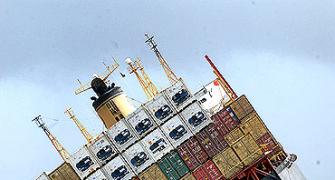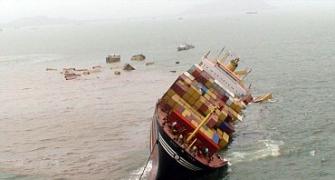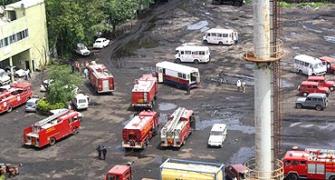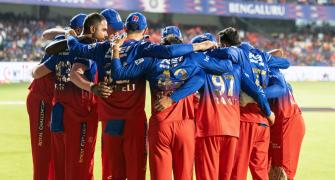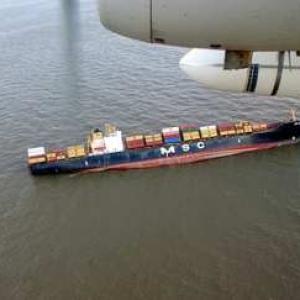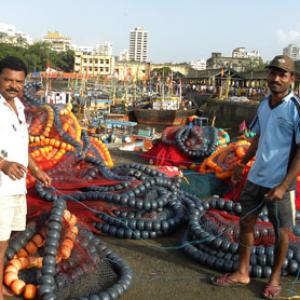For the MV Khailijia 3, one of the two ships which collided last Saturday off the coast of Mumbai, the track record does not read very well. In July, it was found that the ship had developed some cracks and had to offload its cargo mid-sea.
The ship was to be towed to the Mumbai Port. On Saturday, the ship was on its way to the port for maintenance and repair. Dry dock, as it is called in shipping parlance, when it collided with Mediterranean Shipping Company (MSC) Chitra. The collision has led to closure of two of the busiest Indian ports Jawaharlal Nehru Port Trust (JNPT) and Mumbai Port Trust and blocked 20 km of sea channel.
"We would conduct an enquiry and action will be taken against the Khailijia 3 if it is found responsible for the accident," K Mohandas, secretary, Ministry of Shipping, told Business Standard. As of now, Kuwait-based Gulf Rocks, which owns the MV Khailijia, has not been contacted by the Indian government.
Mediterranean Shipping Company is at present conducting the salvage operations. In 2008, one of the vessels of MSC was involved in an accident in European waters, which had resulted in spilling of containers. The MSC Chitra is a 30-year-old vessel.
While many heave a sigh of relief that the ships involved in the accident contained dry cargo and were not tanker ships, several others are saying that India needs to be more strict about the kind of ships it allows on its coast. "World over, countries have banned single-hull (bottom) ships. We have the highest number of single hull ships discharging on the Indian coast. Though both these ships are foreign-owned, they are single-hulled vessels," an official in the Indian National Shipowners' Association said.
In 2007, South Korea had the highest number 182 of single hull vessels and India was a close second, with 115 such ships. In 2009, India reached the top position with 53 single hull ships and Korea slipped to fourth with just 27. India has a deadline of 2010, given by the International Maritime Organisation, to ban all foreign single-hull vessels. The deadline for Indian vessels is 2015.
JNPT and Mumbai Port Trust, which have come to a halt due to the spillage of containers in the 20-km channel, are not likely to see any traffic movement for the next three days at least. "Work is on for clearing the channel and making it navigable. The oil spill has stopped now. We are monitoring the situation closely," Mohandas added. SMIT, a Rotterdam-based company, has been called in by the shipping company for salvage operations.
Ten vessels are waiting to sail out and 12 are waiting for a berth at JNPT. The total revenue from the county's largest container port is Rs 600 crore per annum. With every passing day, the port is losing Rs 3 crore. "We want to revise the Exim trade. This will have a cascading effect on traders. Orders may get cancelled. We are trying to make the sea navigable as soon as possible," said N N Kumar, deputy chairman, JNPT.
Exporters have expressed concern over the disruption of traffic at JNPT and Mumbai Port, which account for over 60 per cent of India's container traffic. "This will impact about $4 billion of trade cargo, if the situation is not addressed by the weekend," said A Sakthivel, president, Federation of Indian Export Organisations.
He added that since each day of delay at the port costs about 0.5 per cent of the value of cargo, Indian importers and exporters would suffer a loss of $20 million. He has also urged the government to waive the demurrage, detention and other charges arising from suspension of operations at JNPT and Mumbai Port. He also expressed apprehensions that stoppage of movement will impact the back-end operations, both at production level in factories and at JNPT, which is already facing congestion due to monsoon.
The clean-up operation involves pumping out 2,000 tonnes of oil from the MSC Chitra to avoid any further damage. About 500 tonnes of oil had leaked after the rupture in the sea. The ship is currently placed on the sand bed. After the oil has been pumped out, the salvagers will assess if it is possible to ballast the vessel on the 'non-broken' side.
The MSC Chitra was carrying 512 containers, of which 200 fell in the sea and have since drifted, making the channel difficult to navigate. The ship was carrying 25 containers of sodium hydroxide. Six other containers were said to be carrying hazardous material. "The substances are in sealed containers, so there is no immediate danger. We don't know yet if those containers are still on the ship or have fallen," Mohandas said.


